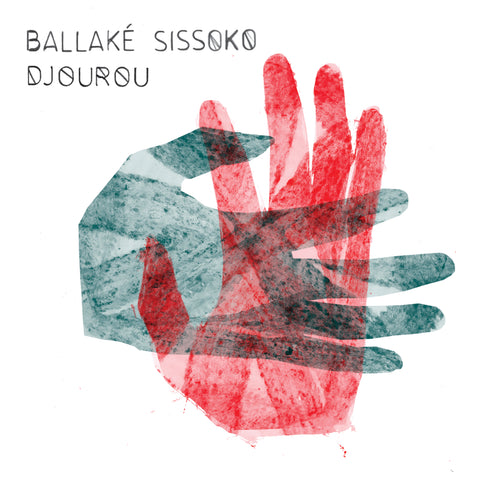Executive production and A&R - Laurent Bizot
Artwork and graphic design - Jérôme Witz, Element-s
Mastered by François Fanelli on October 10th, 2020 at Sonics Mastering studio
Published by Nø Førmat!
Demba Kunda
(Ballaké Sissoko)
Ballaké Sissoko - Kora
Recorded on October 18th, 2018
by Michel Van Achter at Chapelle Sainte-Apolline, Herve, Belgium
Mixed by Yoan Jauneaud at studio Kasbah,
La Grange, Causse de la selle, FR
Djourou
(Ballaké Sissoko)
Ballaké Sissoko - Kora
Sona Jobarteh - Kora, vocals
Recorded on July 26th 2019
by Sébastien Tondo at Studio 12 ter, Montreuil, FR
Mixed by Yoan Jauneaud at studio Kasbah,
La Grange, Causse de la selle, FR
Jeu sur la Symphonie Fantastique
(H. Berlioz, arranged by Vincent Segal)
Work for hire for the Berlioz Festival
Warm thanks to Bruno Messina
Ballaké Sissoko - Kora
Vincent Segal - Cello
Patrick Messina - Clarinet
Recorded on January 6th, 2020
by Sébastien Tondo at Studio 12 ter, Montreuil, FR
Mixed by Yoan Jauneaud at studio Kasbah,
La Grange, Causse de la selle, FR
Guelen
(Salif Keita)
Ballaké Sissoko - Kora
Salif Keita - Vocals
Recorded in November 2012 by Karim Sai and his students
at Studio Moffou, Bamako, Mali during the Vivendi annual sound engineer training session.
Mixed by Yoan Jauneaud at studio Kasbah,
La Grange, Causse de la selle, FR
Kora
(Ballaké Sissoko / Camille Dalmais)
Ballaké Sissoko - Kora
Camille - Vocals
Clément Petit - Cello
Recorded on December 12th, 2019
by Sébastien Tondo at Studio 12 ter, Montreuil, FR
Mixed by Yoan Jauneaud at studio Kasbah,
La Grange, Causse de la selle, FR
Mande Tabolo
(Ballaké Sissoko)
Ballaké Sissoko - Kora
Recorded on October 18th, 2018 by Michel Van Achter
at Chapelle Sainte-Apolline, Herve, Belgium
Mixed by Yoan Jauneaud at studio Kasbah,
La Grange, Causse de la selle, FR
Frotter les Mains
(Ballaké Sissoko / Oxmo Puccino)
Ballaké Sissoko - Kora
Oxmo Puccino - Vocals
Recorded on July 9th 2020 by Renaud Letang at Studios Ferber, Paris, FR
Mixed by Renaud Letang at Studios Ferber, Paris, FR
Kadidja
(Ballaké Sissoko / Piers Faccini)
Ballaké Sissoko - Kora
Piers Faccini - Guitar, vocals
Recorded on August 29th 2019
by Yoan Jauneaud at Le Prieuré de Cézas, FR
Mixed by Yoan Jauneaud at studio Kasbah,
La Grange, Causse de la selle, FR
Un Vêtement Pour la Lune
(Ballaké Sissoko / Arthur Teboul)
Ballaké Sissoko - Kora
Arthur Teboul - Vocals
Raphaël de Pressigny - Percussions, Hang Drum
Antoine Wilson - Keyboards
Recorded on March 2nd, 2020 by Samy Osta,
assisted by Hugo Bracchi at Studio Midi Live Villetaneuse, FR
Mixed by Samy Osta at studio Le Phonographe, Paris, FR
Thanks to all the artists who contributed to this album and to
Corinne Serres
Bruno Messina
Graham Lawson
Pascale Thumerelle
Françoise Le Crom
Claudia Ambruosi
Marie-Annick Darmaillac
Christian Syren
Jean-Philippe Allard
Farah Kammoun, Geraldine Cayrou
Nicole Schluss, Marc Mottin
Michel Van Achter
Karim Sai
Sébastien Tondo
Renaud Letang
Samy Osta
Special thanks to Vincent Segal
and to Yoan Jauneaud and François Fanelli
for their passion an dedication
“Djourou is the cord that connects me to other people”, says Ballaké Sissoko with characteristic simplicity. It would be hard to find a more lucid way of explaining the title, and the spirit, of Sissoko’s new album, which presents the Malian kora-player’s music in all its multi-faceted forms: intimate and universal, singular and plural, solo or in conversation with artists whose contributions come across like declarations of love.
Artists like Oxmo Puccino, giant of French rap, who was invited to feature on the new record by the man who’s become like an uncle to him. “Ballaké Sissoko represents a slice of Malian music history”, he says. “It’s a powerful silence, a sacred music."
Uncle? Makes sense. After more than forty years of loyal service to the 21 strings of the kora, the harp-cum-lute that has become the musical emblem of West Africa, Ballaké Sissoko has achieved elder status. It’s always been a story of love for him, a love that was apparent at the very beginning, when he first started playing his father’s instrument, urged on by his own heart and nothing else. His father, the kora giant and co-director of the famous National Instrumental Ensemble of Mali, Djeli Mady Sissoko, never put any pressure on his first-born son, though he must have sensed his keen attraction to the instrument.
Ballaké would sit in silence for hours, at a safe distance, listening to his father play. So eventually, Djeli Mady decided to entrust the key of the room where the kora was kept to the young boy. For one with such boundless curiosity, there could have been no greater invitation. And so Ballaké started to play, and his talent began to get noticed. But then suddenly, brutally, his father was taken away from him, and Ballaké was catapulted into adulthood.
The eldest son became the family’s main provider. He joined the National Instrumental Ensemble, the state-run orchestra that brought together the greatest instrumentalists from all corners of Mali. There, he learned from his elders (among them Sidiki Diabate, father of Toumani), just by listening, endlessly. He’s never lost that ability to listen – an ability that’s one of the mainstays of a traditional Malian education. You have to listen before you speak and Ballaké learned to listen before he played, to touch with his ears before touching the strings, just as a great photographer might touch with her eyes before pressing the shutter.
Ballaké’s mastery of the classic kora repertoire and his gift for improvisation, fruit of those long spans of silent attentiveness, soon became apparent. But the young musician felt the urge to bring the ancient art of the kora face to face with the music of other worlds, a desire that had little hope of satisfaction within the National Instrument Ensemble. So he embarked on a solo career. He was fascinated by the Indian sitar and the flamenco guitar, and he worked on transposing their techniques to the kora. He discovered Arabic instruments like the qanun (hammered dulcimer) and oud (lute), or western ones like the cello, which can be made to sound like the Malian bolon (traditional bass harp) or soko (traditional monochord violin). This fascination led him, many years later, to a meeting with cellist Vincent Segal and a musical partnership that would give birth to two classics of Malian mixity: Chamber Music and Musiques de Nuit, both on Nø Førmat!
Ballaké Sissoko has often demonstrated a fondness for profoundly meditative tête-à-têtes with his kora (check the album Déli, released in 1997). But he’s also hungered for musical companionship and the wonders that result from a true marriage of the art of listening and the art of playing. Whether duetting with Toumani Diabate on New Ancient Strings (the follow up to the foundational kora album Ancient Strings or ‘Cordes Anciennes’, recorded by Ballaké and Toumani’s respective fathers, Djelimady and Sidiki, back in 1970), or with the pianist Ludovico Einaudi on the jazzy poetic road-trip that became Diarió Mali, Ballaké revels in the kind of dialogue where every note seem to speak with two voices. Or even three (as happened when he rubbed shoulders with the valiha of Rajery and the oud of Driss el Maloumi in the trio 3MA).
Djourou is a magnificent distillation of that same art: the art of being yourself and being with others. It combines pieces in which Ballaké converses, all alone, with his kora, and others in which he takes palpable pleasure in dialoguing musicians from distant horizons. Both approaches are handled with equal precision.
Everyone is tied to Ballaké by that invisible string, that djourou, each in their own way. For Oxmo Puccino, interacting with Ballaké’s kora, whose “ancient notes resonate all the way back to the ancestors”, is like going back to the old country, Mali, and to his childhood. Puccino, who loves rubbing words together to create poetic sparks, has contributed a lyric about rubbing hands, about the joy of meeting, of touching, in a world that is becoming ever more contactless and distanced. When Ballaké pays, Puccino sees “a ballet of fingers on dozens of strings. It’s beautiful to watch. It’s as if he’s knitting the music together.”
The French singer Camille shares Puccino’s fascination and knits her own words into a sublime love letter to the kora. Vincent Segal (cello) and Patrick Messina (clarinet) team up with Ballaké to take Berlioz and his Symphonie Fantastique on an epic journey along the banks of the Niger river, a place rich in heroic sagas of its own. The voice of Piers Faccini, another of Ballaké’s longstanding fellow-travellers, floats above the deep notes of Ballaké’s kora on Kadidja – a ballad sung in Bamanan, the language of the Bambara people of Mali – creating colours that are both startlingly new and profoundly moving. Each of these duos has its own creative rationale, its own story, its own magic.
Inviting Sona Jobarteh, the talented female kora player from The Gambia, to guest on the album was Ballaké’s way of uniting the generations and reconnecting with their common forebears, weaving a thread across borders that were unknown to the griots back in the days when the Malian empire radiated over much of West Africa. The depth and power of history also resonates in ‘Guelen’, a spontaneous and intimate duo that pairs Ballaké’s kora with the sacred voice of Salif Keita, recorded ‘at home’ in Keita’s Mouffou Studios in Bamako.
Bringing the album to its conclusion, Ballaké takes the strings of his kora on a madcap adventure in the company of Arthur Teboul, singer with French mavericks Feu! Chatterton. Together they reach for the stars and reclothe them in poetry. It’s the culmination of journey during which the string, the djourou that connects Ballaké to all those myriad musicians and styles reveals a deeper power: the ability to connect us to the earth, to the stars, to others and to ourselves.
16/04/2022 FRIBOURG (CH) La Spirale
03/09/2022 ROVERETO (IT) Oriente Festival



